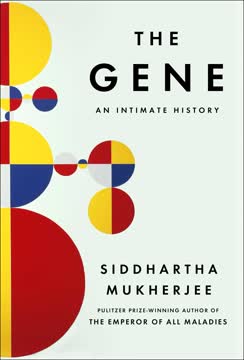نکات کلیدی
1. سیستم ایمنی: شبکه پیچیده دفاعی بدن شما
سیستم ایمنی تنها ابزاری برای از بین بردن سرفه شما نیست. این سیستم به طور جداییناپذیری با تقریباً تمام فرآیندهای دیگر در بدن شما مرتبط است و در حالی که برای زنده نگه داشتن شما بسیار مهم است، ممکن است همان بخشی از بدن شما باشد که باعث مرگ زودرس شما میشود، چه به دلیل ناکارآمدی و چه به دلیل فعالیت بیش از حد.
یک شبکه وسیع. سیستم ایمنی شبکهای پیچیده از اندامها، سلولها و پروتئینها است که با هم کار میکنند تا بدن شما را از مهاجمان مضر محافظت کنند. این سیستم تنها یک موجودیت واحد نیست، بلکه سیستمی پیچیده است که در سراسر بدن شما گسترده شده است.
- اجزای کلیدی:
- غدد لنفاوی
- مغز استخوان
- تیموس
- طحال
- سلولهای سفید خون (مانند سلولهای T، سلولهای B، ماکروفاژها)
- آنتیبادیها
تعادل کلیدی است. سیستم ایمنی باید تعادلی ظریف بین قوی بودن برای مبارزه با پاتوژنها و تنظیم شده بودن برای جلوگیری از حمله به خود بدن را حفظ کند. این تعادل برای سلامت کلی و طول عمر بسیار مهم است.
2. ایمنی ذاتی: خط مقدم دفاع در برابر مهاجمان
سربازان سیستم ایمنی ذاتی در طول زندگی شما میلیاردها دشمن و انگل را کشتهاند و آمادهاند تا میلیاردها یا تریلیونها بیشتر را بکشند.
خط اول دفاع. سیستم ایمنی ذاتی پاسخ فوری بدن شما به تهدیدات است. این سیستم غیر اختصاصی است، به این معنی که بین انواع مختلف پاتوژنها تمایز قائل نمیشود، اما به سرعت عمل میکند تا تهدیدات احتمالی را مهار و از بین ببرد.
اجزای کلیدی ایمنی ذاتی:
- موانع فیزیکی: پوست، غشاهای مخاطی
- موانع شیمیایی: اسید معده، آنزیمهای موجود در بزاق و اشک
- پاسخهای سلولی: ماکروفاژها، نوتروفیلها، سلولهای کشنده طبیعی
- پاسخ التهابی: قرمزی، تورم، گرما و درد
همیشه در حالت آمادهباش. این سیستم به طور مداوم فعال است و بدن را برای هر نشانهای از خطر گشت میزند. این همان چیزی است که باعث واکنشهای فوری مانند التهاب هنگام بریدگی یا عفونت میشود.
3. ایمنی تطبیقی: سیستم پاسخ هدفمند بدن شما
سیستم ایمنی تطبیقی "هر مهاجم ممکن" را میشناسد. نامش، آنچه برای صبحانه خورده، رنگ مورد علاقهاش، امیدها و آرزوهای صمیمیاش.
هدفگیری دقیق. سیستم ایمنی تطبیقی مانند یک نیروی نظامی بسیار تخصصی است. این سیستم سلاحهای سفارشی (آنتیبادیها) برای مبارزه با مهاجمان خاص ایجاد میکند و آنها را برای مواجهات آینده به خاطر میسپارد.
ویژگیهای کلیدی ایمنی تطبیقی:
- اختصاصیت: هدفگیری پاتوژنهای خاص
- حافظه: به خاطر سپردن عفونتهای گذشته برای پاسخهای سریعتر در آینده
- تطبیقپذیری: توانایی پاسخ به تهدیدات جدید
زمان و دقت. در حالی که پاسخدهی آن کندتر از ایمنی ذاتی است، سیستم تطبیقی پس از فعال شدن بسیار دقیق و کارآمد است. این سیستم مسئول ایمنی بلندمدت است و اساس کار واکسنها را تشکیل میدهد.
4. میکروبیوم: اکوسیستم بدن شما از میکروبهای مفید
بدن شما میخواهد از برخی خلاص شود اما نمیتواند و باید یاد بگیرد با آنها همزیستی کند، برخی دیگر خنثی هستند و گروه بزرگی مستقیماً برای سلامتی شما مفید هستند. این جوامع میکروارگانیسمهای همزیست به اندازه هر یک از اندامهای شما برای بقا و سلامتی شما ضروری هستند.
رابطه همزیستی. بدن انسان میزبان تریلیونها میکروارگانیسم است که به طور جمعی به عنوان میکروبیوم شناخته میشوند. این میکروبها نقشهای حیاتی در هضم، ایمنی و سلامت کلی ایفا میکنند.
نکات کلیدی درباره میکروبیوم:
- مکان: عمدتاً در روده، اما همچنین روی پوست و مناطق دیگر
- تنوع: صدها گونه باکتری، قارچ و ویروس
- عملکردها: کمک به هضم، تولید ویتامینها، آموزش سیستم ایمنی
تعادل حیاتی است. یک میکروبیوم سالم متنوع و متعادل است. اختلالات در این تعادل (از طریق آنتیبیوتیکها، رژیم غذایی نامناسب و غیره) میتواند منجر به مشکلات مختلف سلامتی، از جمله ضعف ایمنی شود.
5. بیماریهای خودایمنی: زمانی که سیستم ایمنی به خود حمله میکند
بیماریهای خودایمنی به سادگی اتفاق نمیافتند. برای اکثر افراد، آنها یک مورد بزرگ از بدشانسی هستند.
هویت اشتباه. در بیماریهای خودایمنی، سیستم ایمنی به اشتباه سلولهای سالم را به عنوان مهاجمان خارجی شناسایی کرده و به آنها حمله میکند. این میتواند منجر به طیف وسیعی از شرایطی شود که بخشهای مختلف بدن را تحت تأثیر قرار میدهد.
بیماریهای خودایمنی رایج:
- آرتریت روماتوئید
- دیابت نوع 1
- مولتیپل اسکلروزیس
- لوپوس
- پسوریازیس
علل پیچیده. علل دقیق بیماریهای خودایمنی به طور کامل درک نشدهاند، اما احتمالاً شامل ترکیبی از پیشزمینه ژنتیکی و عوامل محیطی هستند. مدیریت این شرایط اغلب شامل سرکوب یا تنظیم پاسخ ایمنی است.
6. آلرژیها: واکنشهای بیش از حد سیستم ایمنی
آلرژیک بودن به این معناست که سیستم ایمنی به شدت به چیزی که ممکن است چندان خطرناک نباشد، واکنش نشان میدهد.
واکنشهای حساسیتی. آلرژیها زمانی رخ میدهند که سیستم ایمنی به مواد بیضرر (آلرژنها) در محیط بیش از حد واکنش نشان میدهد. این واکنش بیش از حد میتواند از ناراحتی خفیف تا وضعیتهای تهدیدکننده زندگی متغیر باشد.
آلرژیها و علائم رایج:
- تب یونجه: عطسه، آبریزش بینی، خارش چشمها
- آلرژیهای غذایی: کهیر، تورم، مشکلات گوارشی
- آلرژی به نیش حشرات: تورم، دشواری در تنفس
- آنافیلاکسی: واکنش آلرژیک شدید و بالقوه کشنده
درک در حال تکامل. درک ما از آلرژیها همچنان در حال تکامل است. تحقیقات اخیر نشان میدهد که مواجهه زودهنگام با آلرژنهای بالقوه ممکن است در واقع به پیشگیری از آلرژیها کمک کند و باورهای قبلی درباره اجتناب را به چالش بکشد.
7. تقویت ایمنی: افسانهها و ترویج سلامت
تقویت سیستم ایمنی ایدهای وحشتناک است که توسط افرادی استفاده میشود که میخواهند شما را وادار به خرید چیزهای بیفایده کنند!
متعادل، نه تقویت شده. ایده "تقویت" سیستم ایمنی عمدتاً یک افسانه است. یک سیستم ایمنی سالم درباره تعادل است، نه قدرت. ایمنی بیش از حد فعال میتواند به اندازه ایمنی کمفعال مضر باشد.
عواملی که از سلامت ایمنی حمایت میکنند:
- رژیم غذایی متعادل غنی از میوهها و سبزیجات
- ورزش منظم
- خواب کافی
- مدیریت استرس
- اجتناب از سیگار کشیدن و مصرف بیش از حد الکل
مراقب راهحلهای سریع باشید. بیشتر محصولاتی که ادعا میکنند ایمنی را "تقویت" میکنند، فاقد شواهد علمی هستند. به جای جستجوی مکملهای معجزهآسا، بر سلامت کلی و انتخابهای سبک زندگی که از عملکرد طبیعی سیستم ایمنی شما حمایت میکنند، تمرکز کنید.
8. استرس و ایمنی: ارتباط ذهن و بدن
در طبیعت، استرس معمولاً با خطر وجودی مرتبط است، مانند رقیبی که وارد قلمرو شما میشود یا شکارچی که میخواهد شما را به وعده غذایی خود تبدیل کند.
باقیمانده تکاملی. پاسخ استرس ما به عنوان یک مکانیسم بقا تکامل یافته است و بدن را برای "جنگ یا گریز" آماده میکند. با این حال، در زندگی مدرن، استرس مزمن میتواند اثرات زیانباری بر سیستم ایمنی داشته باشد.
اثرات استرس مزمن بر ایمنی:
- افزایش التهاب
- سرکوب عملکرد ایمنی
- حساسیت بیشتر به عفونتها
- کندی در بهبود زخم
ارتباط ذهن و بدن. مدیریت استرس از طریق تکنیکهایی مانند مدیتیشن، ورزش و ارتباط اجتماعی میتواند اثرات مثبتی بر عملکرد ایمنی داشته باشد. این امر بر ارتباط مهم بین سلامت روانی و جسمی در ایمنی کلی تأکید میکند.
آخرین بهروزرسانی::
FAQ
What's Immune: A Journey into the Mysterious System that Keeps You Alive about?
- Exploration of the Immune System: The book delves into the complexities of the human immune system, explaining how it protects us from various pathogens and diseases.
- Engaging Narrative Style: Philipp Dettmer uses relatable analogies and storytelling to make complex scientific concepts accessible to readers without a background in immunology.
- Connection to Modern Issues: It addresses contemporary health issues, including the rise of autoimmune diseases and the impact of the COVID-19 pandemic on our understanding of immunity.
Why should I read Immune by Philipp Dettmer?
- Understanding Health Better: The book provides essential knowledge about how the immune system functions, which can help readers make informed decisions about their health and wellness.
- Relevance to Current Events: With ongoing discussions around health, vaccines, and pandemics, this book offers valuable insights into how our immune system functions.
- Holistic Perspective: It connects the immune system to various aspects of health, disease, and lifestyle choices, helping readers appreciate the importance of maintaining a healthy immune system.
What are the key takeaways of Immune?
- Immune System Complexity: The immune system is described as "the most complex biological system known to humanity," with intricate interactions among various cells and proteins.
- Balance is Essential: A well-functioning immune system requires balance; it must be strong enough to fight infections but not so aggressive that it attacks the body itself.
- Role of Memory Cells: Memory cells play a crucial role in long-term immunity, allowing the body to remember past infections and respond more effectively to future encounters.
What are the best quotes from Immune and what do they mean?
- "Your immune system is not a singular thing.": This quote underscores the complexity of the immune system, highlighting its various components and their interconnections.
- "You are a biosphere, surrounded by invaders that want to get in.": This emphasizes the constant battle between our bodies and the myriad of microorganisms that inhabit our environment.
- "What doesn’t kill you doesn’t make you stronger.": This challenges the notion that exposure to pathogens always strengthens the immune system, highlighting the risks of excessive exposure.
How does the immune system work according to Immune?
- Defense Mechanisms: The immune system employs various defense mechanisms, including physical barriers, innate immunity, and adaptive immunity.
- Cellular Interactions: Key players include T cells, B cells, and macrophages, which communicate and coordinate their actions through signaling molecules called cytokines.
- Memory Formation: After an infection, the immune system creates memory cells that allow for a faster and more efficient response to future infections.
What is the Innate Immune System according to Immune?
- First Line of Defense: The Innate Immune System is the body's immediate response to pathogens, acting within seconds of an invasion.
- Generalized Response: It employs broad mechanisms to combat a wide range of pathogens, rather than targeting specific invaders.
- Key Components: Major players include Macrophages and Neutrophils, which actively engage and eliminate pathogens through various methods, including phagocytosis.
How does the Adaptive Immune System work according to Immune?
- Specificity and Memory: The Adaptive Immune System develops specific responses to pathogens and retains memory of past infections for faster responses in the future.
- Role of T Cells and B Cells: T Cells coordinate the immune response, while B Cells produce antibodies that target specific antigens.
- Activation Process: Activation requires two signals: recognition of an antigen by a T Cell and additional stimulation from a Dendritic Cell.
What is the Hygiene Hypothesis mentioned in Immune?
- Connection to Allergies: The Hygiene Hypothesis suggests that reduced exposure to microbes in modern, sanitized environments may lead to an increase in allergies and autoimmune diseases.
- Impact of Urbanization: As societies have become more urbanized and hygienic, the diversity of microbial exposure has decreased, potentially leading to an imbalance in immune responses.
- Need for Microbial Diversity: The hypothesis emphasizes the importance of maintaining a diverse microbiome for optimal immune function.
How do vaccines work according to Immune?
- Inducing Immune Response: Vaccines work by introducing a harmless component of a pathogen to stimulate the immune system.
- Memory Cell Formation: Vaccination leads to the production of memory cells, which provide long-term immunity.
- Types of Vaccines: There are various types of vaccines, including live-attenuated, inactivated, and subunit vaccines, each designed to provoke an immune response without causing disease.
What are Antibodies and their functions according to Immune?
- Specialized Proteins: Antibodies are proteins produced by B Cells that specifically bind to antigens, marking them for destruction.
- Multiple Functions: They can opsonize pathogens, neutralize toxins, and activate the complement system to enhance the immune response.
- Diverse Classes: There are different classes of antibodies (IgM, IgG, IgA, IgE), each serving unique roles in immune defense.
How does inflammation contribute to the immune response according to Immune?
- Universal Response: Inflammation is triggered by injury or infection, serving to contain pathogens and facilitate healing.
- Five Key Signs: The classic signs of inflammation include redness, heat, swelling, pain, and loss of function.
- Double-Edged Sword: While inflammation is essential for fighting infections, chronic inflammation can lead to various diseases and health issues.
How does Immune explain autoimmune diseases?
- Misguided Immune Response: Autoimmune diseases occur when the immune system mistakenly attacks the body's own cells.
- Role of Self-Antigens: The immune system can recognize self-antigens, leading to an inappropriate immune response.
- Complex Interactions: The development of autoimmune diseases involves complex interactions between genetic factors, environmental influences, and immune system responses.
نقد و بررسی
کتاب ایمنی نوشتهی فیلیپ دتمیر به دلیل توضیح قابل فهم سیستم پیچیدهی ایمنی انسان بسیار مورد تحسین قرار گرفته است. خوانندگان از سبک نوشتاری جذاب دتمیر، استفاده از استعارهها و تصاویر رنگارنگ او قدردانی میکنند. این کتاب به خاطر تواناییاش در سادهسازی مفاهیم دشوار بدون سادهانگاری بیش از حد، هم برای افراد عادی و هم برای کسانی که زمینهی علمی دارند، جذاب است. بسیاری از منتقدان به طنز کتاب و رویکرد داستانسرایی جذاب آن اشاره میکنند. در حالی که برخی از شخصیتپردازی سلولها را ناهنجار میدانند، اکثر افراد موافقند که این امر به درک بهتر کمک میکند. به طور کلی، این کتاب به دلیل ارائهی شفاف و جامع از ایمنیشناسی به شدت توصیه میشود.
Similar Books














